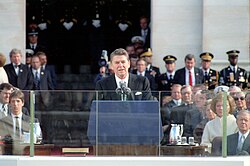Portal:Conservatism
| Main page | Showcase | Project |
Introduction
Conservatism is a cultural, social, and political philosophy and ideology, which seeks to promote and preserve traditional institutions, customs, and values. The central tenets of conservatism may vary in relation to the culture and civilization in which it appears. In Western culture, depending on the particular nation, conservatives seek to promote a range of institutions, such as the nuclear family, organized religion, the military, the nation-state, property rights, rule of law, aristocracy, and monarchy. Conservatives tend to favour institutions and practices that enhance social order and historical continuity.
Edmund Burke, an 18th-century Anglo-Irish statesman who opposed the French Revolution but supported the American Revolution, is credited as one of the forefathers of conservative thought in the 1790s along with Savoyard statesman Joseph de Maistre. The first established use of the term in a political context originated in 1818 with François-René de Chateaubriand during the period of Bourbon Restoration that sought to roll back the policies of the French Revolution and establish social order.
Conservatism has varied considerably as it has adapted itself to existing traditions and national cultures. Thus, conservatives from different parts of the world, each upholding their respective traditions, may disagree on a wide range of issues. Historically associated with right-wing politics, the term has been used to describe a wide range of views. Conservatism may be either libertarian or authoritarian, populist or elitist, progressive or reactionary, moderate or extreme. (Full article...)
Selected article
The concept of tradition, as the notion of holding on to a previous time, is also found in political and philosophical discourse. For example, the political concept of traditionalism is based around it, as are strands of many world religions including traditional Catholicism. A number of factors can exacerbate the loss of tradition, including industrialization, globalization, and the assimilation or marginalization of specific cultural groups. In response to this, tradition-preservation attempts have now been started in many countries around the world, focusing on aspects such as traditional languages. Tradition is usually contrasted with the goal of modernity and should be differentiated from customs, conventions, laws, norms, routines, rules and similar concepts.
Selected quote
Conservative: One who admires radicals a century after they're dead.
— Leo Rosten, in R.L. Woods's The Modern Handbook of Humor (1967)
Selected image
The first inauguration of Ronald Reagan as the 40th President of the United States was held on January 20, 1981. The inauguration marked the commencement of the first four-year term of Ronald Reagan as President and George H. W. Bush as Vice President. Chief Justice Warren E. Burger administered the oath of office. Minutes later, the Americans held hostage in Iran were released.
Did you know...
- ... that California began celebrating Ronald Reagan Day on February 6, 2011, which would have been Reagan's 100th birthday?
- ... that author Jonathan Krohn gave a two-minute speech at the 2009 Conservative Political Action Conference at age thirteen?
- ... that Theodore Dalrymple's book Our Culture, What's Left of It describes British culture as a "moral swamp"?
Selected anniversaries in April
- 1960 – Barry Goldwater publishes The Conscience of a Conservative. The book reignited the American conservative movement and made Goldwater a star.
- 1948 – the period known as La Violencia begins with the assassination of Colombian Liberal Party leader Jorge Eliécer Gaitán. For the next ten years Liberals, Communists and Conservatives would fight each other in the conflict.
- 1980 – the first Washington for Jesus rally is held in Washington, D.C. It will become part of the burgeoning Christian Right movement.
Topics
Associated Wikimedia
The following Wikimedia Foundation sister projects provide more on this subject:
-
Commons
Free media repository -
Wikibooks
Free textbooks and manuals -
Wikidata
Free knowledge base -
Wikinews
Free-content news -
Wikiquote
Collection of quotations -
Wikisource
Free-content library -
Wikiversity
Free learning tools -
Wiktionary
Dictionary and thesaurus










